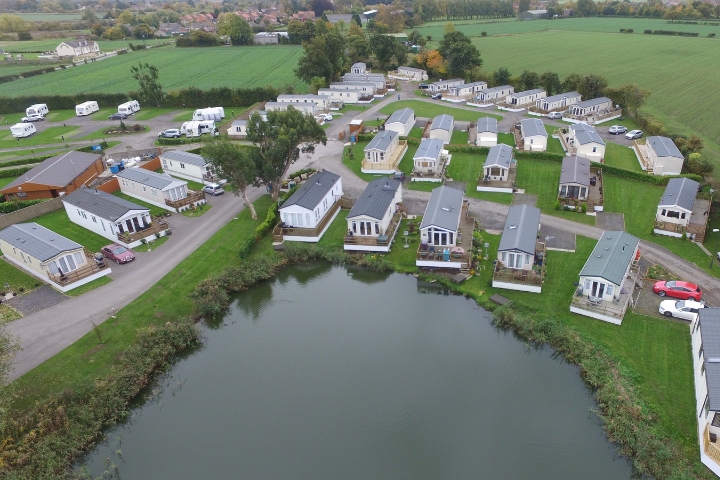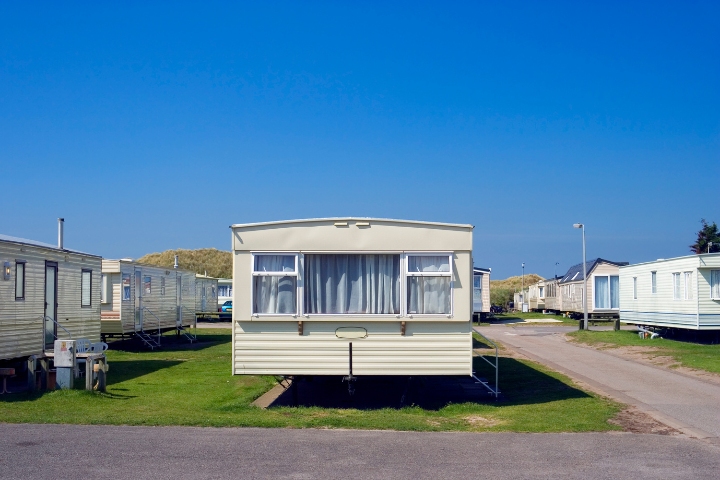If you’ve been wondering “can I put a static caravan on my land?” or “do I need planning permission for a static caravan?”, you’re not alone. Many people across the UK look to place static caravans on private land for various purposes, from holiday accommodation to temporary residence during a renovation project or self-build.
However, before making a purchase, it’s essential to understand the relevant planning rules, the role of your local planning authority, and how static caravan laws on private land may apply to your specific situation. Here, we look at common questions and key points to be aware of.
Once you have the correct permissions, call 01403 274877 to view our used static caravans for sale at our showgrounds in Horsham, West Sussex. We can even transport and site your static caravan within 100 miles.
Please note: This guide is for general informational purposes only and should not be considered legal advice. Always consult your local council or a qualified planning consultant before taking action.
What is a static caravan?
A static caravan is defined as a structure designed or adapted for human habitation, which is capable of being moved, but is not designed for towing on public roads like a touring caravan or motor vehicle. According to the Caravan Sites Act 1968, a static caravan (including twin units) must remain physically capable of being transported in not more than two sections and assembled on site.
These units typically include cooking facilities, toilet facilities, and space for sleeping and living, making them ideal for additional living space, cheap home options, or temporary accommodation on private land.
Modern static caravans offer stylish, comfortable interiors with features such as central heating, double glazing, integrated appliances, and open-plan living areas, combining the convenience of mobile housing with the comfort of a permanent home. Many come with contemporary finishes, making them an attractive and practical solution.
Browse new and used static caravans
What is planning permission?
Planning permission is official approval from your local planning authority that allows you to carry out a development or change the use of land or buildings. It ensures that proposed developments are appropriate for the area and comply with national and local planning policies.
In the context of static caravans, planning permission may be required not just for placing the caravan, but also for using it as a residence or changing how the land is used. Whether permission is needed depends on factors like the caravan’s location, use, and connection to existing buildings. Always check with your local council to confirm whether your specific plans require approval.
Do you need planning permission for a static caravan?
The need for planning permission depends on how and where the static caravan is used. There’s no one-size-fits-all answer, so it’s crucial to assess your situation in detail.
When planning permission may not be required
You may not need planning permission if:
- The caravan is placed within the curtilage (boundary) of your home and is used for purposes ancillary to the main dwelling, such as housing family members, use as a home office, or short-term holiday accommodation for non-paying guests like family or occasional visitors.
- It is not used as a self-contained or independent dwelling, meaning it doesn’t function as a fully independent residence.
- There is no material change of use of the land (i.e., the land’s primary use remains unchanged and the caravan’s use is incidental to that use).
That said, some local councils interpret these exemptions narrowly. It is always advisable to contact your local planning authority for confirmation, ideally in writing, to avoid receiving an enforcement notice later.
When planning permission is required
You will generally require planning permission if:
- The caravan is being used as an independent residence or primary residence.
- It’s being placed on agricultural land, forestry land, or land not connected to an existing house.
- The caravan is occupied for long-term use with separate utility connections and access.
- The caravan is used for commercial purposes, such as renting out for holiday lets.
- You’re establishing a caravan site for seasonal workers, farm workers, or house workers.
- You’re in a conservation area or Area of Outstanding Natural Beauty (AONB).
In such cases, a full planning application must be submitted to your local planning authority. They will assess the potential impact on neighbours, traffic, environmental factors, and health and safety legislation.
Caravan planning permission on agricultural land
Placing a static caravan on agricultural land can be complex. This land type is usually not classified for residential use. Therefore, even if you’re housing farm workers or supporting a small farm, you’ll almost always need permission.
In limited cases – such as temporary agricultural use during lambing season or for temporary accommodation during construction – you may be able to place a caravan without full planning consent, though notification or prior approval from your local authority may still be required. However, these uses must be genuinely temporary and directly tied to the land’s existing use.
Failure to comply could lead to planning breaches and enforcement action.
Living in a static caravan on your own land
Living in a caravan on your own land is a common aspiration, but it often requires permission.
If the caravan is being used as your main residence or by family members as independent accommodation, it will typically constitute a material change of use, triggering the need for planning permission. Simply owning the land does not automatically entitle you to live in a caravan on it; planning rules still apply to changes in use and habitation.
Exceptions might apply if:
- The caravan is occupied temporarily, such as during a self-build or renovation project. In some cases, you may be allowed to live in a static caravan on-site without full planning permission for up to two years under permitted development rights, provided it is clearly linked to the construction of a dwelling and the local planning authority is notified.
- Certain planning exemptions or permitted development rights may apply, depending on the situation and local planning policy.
- The use remains ancillary to the main house and is not fully self-contained.
Again, confirm with your local authority, as rules and enforcement vary.
Can you put a static caravan in your garden?
In many cases, yes, as long as certain conditions are met.
A static caravan placed in a garden or on other private land may not require planning permission if:
- It is not being used as a separate dwelling.
- It remains movable and fits within the legal definition of a caravan.
- It is used for purposes incidental to the main house – e.g., as an office.
However, if you install it as a permanent residence, rent it out, or connect it to utilities for human habitation, planning permission is likely required.
Even if planning permission is not required to physically place the caravan in your garden, using it as a self-contained or independent dwelling will almost always require planning consent, regardless of location.
As interpretations can vary between councils, it’s strongly recommended to get written confirmation from your local planning authority before placing a caravan in your garden.
Can you put a caravan on amenity land or other land types?
Land designated as amenity land – such as landscaped areas within housing developments – is often subject to restrictions. Siting a caravan here may breach covenants or planning controls, even if the land is privately owned.
Placing a caravan near or on land connected to railway systems, such as railway rolling stock or rails forming part of transport infrastructure, would also be highly regulated and likely to require specialised approval.
Always check land titles and speak with the local council before placing a caravan on other land types.
Caravan site licensing
If you intend to use land as a caravan site (i.e., hosting more than one caravan or allowing caravans to be used as residences), you’ll typically need:
- Planning permission
- A caravan site licence, issued by your local council
Under the Caravan Sites and Control of Development Act 1960, exceptions apply for certain agricultural or forestry uses, seasonal workers, or small private uses. Still, they are limited and often subject to time and use conditions.
These exemptions typically apply to certified caravan sites managed by recognised organisations, such as the Camping and Caravanning Club, rather than private residential land use. Even for farm-related purposes, exemption from licensing or planning often requires the use to be temporary, and you may still need to notify or obtain prior approval from your local planning authority.
Health, safety, and human habitation standards
Regardless of planning status, a caravan intended for human habitation must meet basic standards under health and safety legislation. These include:
- Safe installation of toilet facilities, heating, and cooking facilities
- Proper electrical and gas safety certification
- Adequate access and drainage
These requirements are especially important for family members living in the unit or if the caravan is to be used on a long-term or permanent basis.
Summary: What you need to know
Placing a static caravan on private land in the UK requires careful consideration. Here’s a quick recap:
- If the caravan is used ancillary to the main dwelling, planning permission may not be needed
- If it’s used as a main residence or on agricultural land, you will almost certainly need planning permission
- Always consult your local planning authority before siting a caravan to avoid enforcement notices
- Health and safety legislation still applies even if planning permission isn’t required
- Caravan site licences are required for most commercial or multi-caravan setups
- Seek written confirmation from your local planning authority before placing or using a static caravan.
Please remember, this guide provides a general overview. For advice specific to your circumstances, always seek guidance from your local council or a qualified planning professional for detailed information to ensure full compliance with the law.
Buy high-quality static caravans with N. Doe Caravans
At N. Doe Caravans, we stock a wide range of high-quality static caravans for all types of needs, whether you’re supporting a renovation project, housing workers, or exploring temporary accommodation options. Our experienced staff can help you find the right model for your budget, with statics from leading brands ready to view.
Call us to book a visit to our showgrounds in Horsham, West Sussex, or explore our stock online. Please get in touch with any questions regarding our static caravans and services.
FAQs
Can I live in a static caravan on my land all year round?
Not without planning permission in most cases. If the caravan is used as your main residence or as independent accommodation (i.e. not ancillary to an existing dwelling), this typically constitutes a material change of use of the land, which requires approval from your local planning authority.
Does a static caravan count as a permanent dwelling?
A static caravan can be classed as a permanent dwelling if it is used as a self-contained living space on a long-term basis, especially if it includes sleeping, cooking, and washing facilities. In such cases, planning permission is almost always required, even if the caravan is placed on private land you own.
What happens if I don’t get planning permission for my static caravan when I need it?
If you place a static caravan without the necessary planning permission, your local planning authority may issue an enforcement notice requiring you to remove the caravan or cease using it as a residence. Ignoring the notice can result in legal action, fines, and an order to restore the land to its previous condition. Always check with your local council before installing or occupying a static caravan to avoid costly mistakes and disruption.
< Back to Blog
